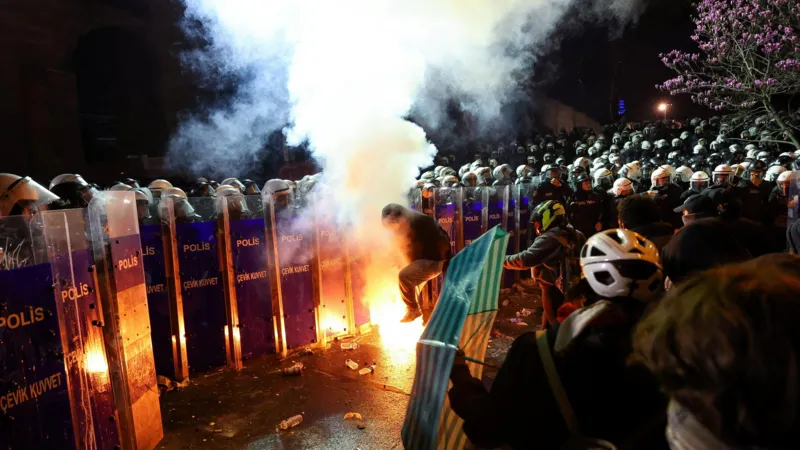
Protesters in Turkey rally 'for justice'
In a dramatic escalation of political tensions, Turkey has been engulfed in widespread protests following the arrest of Istanbul’s Mayor, Ekrem İmamoğlu, on charges of embezzlement and corruption—allegations he staunchly denies. The arrest, perceived by many as a politically motivated move to sideline President Recep Tayyip Erdoğan’s main rival ahead of the 2028 presidential elections, has ignited nationwide demonstrations advocating for justice and democratic integrity.
The Arrest and Its Immediate Aftermath
On March 19, 2025, İmamoğlu was detained alongside nearly 90 other individuals, including journalists and business figures, under accusations of financial misconduct and purported links to terrorist activities. This operation unfolded just days before İmamoğlu was anticipated to announce his presidential candidacy under the Republican People’s Party (CHP), intensifying suspicions about the timing and intent behind the arrest.
The government’s swift action extended beyond İmamoğlu’s detention. Istanbul University annulled his diploma, effectively disqualifying him from presidential eligibility, as a university degree is constitutionally required to run for the nation’s highest office. İmamoğlu has vowed to challenge this decision, viewing it as part of a broader strategy to impede his political ascent.
Eruption of Nationwide Protests
In response to the arrest, tens of thousands of citizens flooded the streets of Istanbul, defying government-imposed bans on public gatherings. The initial protests outside the Istanbul courthouse quickly expanded, with demonstrators chanting slogans such as “Don’t be silent! Otherwise, they’ll come for you” and holding placards reading “Rights, law, justice.”
Government’s Stance and International Reaction
President Erdoğan has dismissed the protests as attempts to incite unrest, accusing the CHP of exploiting the situation to destabilize the country. He warned that the government would not tolerate “street terror,” emphasizing a zero-tolerance policy toward actions he perceives as threats to national stability.
International reactions have been notably subdued. The United Nations and the United States have issued limited statements, while European leaders have prioritized geopolitical concerns over direct criticism of Erdoğan’s administration. This muted response has frustrated many within Turkey, who feel abandoned by the global community in their pursuit of democratic reforms.
Historical Context and Parallels
The current protests draw parallels to Turkey’s 2017 March for Justice, a 450-kilometer march from Ankara to Istanbul protesting government crackdowns following the 2016 coup attempt. Both movements highlight deep-seated concerns about the erosion of judicial independence and democratic norms under Erdoğan’s rule.
Economic and Political Implications
The political turmoil has precipitated economic instability, with Turkish assets experiencing significant sell-offs and the central bank intervening to defend the lira. The uncertainty has further strained an economy already grappling with high inflation and unemployment, exacerbating public dissatisfaction.
Politically, İmamoğlu’s arrest has galvanized the opposition, uniting various factions in a collective call for democratic restoration. The CHP has condemned the arrest as a “coup” and is organizing symbolic elections to demonstrate solidarity with İmamoğlu. This unity among opposition parties presents a formidable challenge to Erdoğan’s two-decade-long tenure, especially as he seeks constitutional amendments to extend his rule beyond current term limits.
Public Sentiment and Future Outlook
The protests reflect a broad spectrum of Turkish society, from urban professionals to rural citizens, all advocating for justice, rule of law, and democratic accountability. Many protesters express a deep-seated fear that the country is veering toward authoritarianism, with İmamoğlu’s arrest symbolizing a tipping point in the struggle for Turkey’s democratic soul.
As demonstrations persist, the government’s response in the coming days will be pivotal. A heavy-handed crackdown could further inflame public sentiment, while concessions or dialogue with opposition figures might pave the way for de-escalation. The international community’s role, though currently limited, could also influence the trajectory of events, depending on whether global leaders choose to exert diplomatic pressure on Ankara.
In summary, Turkey stands at a critical juncture, with the arrest of Ekrem İmamoğlu serving as a catalyst for nationwide demands for justice and democratic integrity. The unfolding events will not only shape the country’s immediate political landscape but also have profound implications for its future as a democratic nation.

Democracy, Rights, law, justice